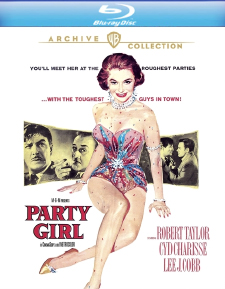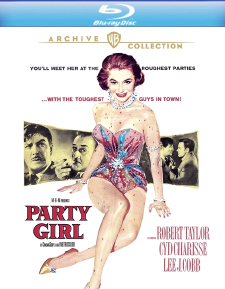Party Girl (1958) (Blu-ray Review)

Director
Nicholas RayRelease Date(s)
1958 (November 30, 2021)Studio(s)
Metro-Goldwyn-Mayer (Warner Archive Collection)- Film/Program Grade: B
- Video Grade: A
- Audio Grade: A-
- Extras Grade: D-
Review
Set in Prohibition-era Chicago, Party Girl is a gangland melodrama centered on hard-edged nightclub dancer Vicki Gaye (Cyd Charisse), who makes extra bucks hanging out with underworld types. Thomas Farrell (Robert Taylor) is a mob lawyer representing Rico Angelo (Lee J. Cobb) and his gang. Vicki meets Farrell at a party celebrating Rico’s recent court victory. Farrell takes Vicki home, where they discover that her pregnant, unwed roommate has killed herself. Farrell consoles Vicki and a romance develops between these two wounded souls who have prostituted themselves to survive.
At Vicki’s urging, Farrell tells Rico he wants out, but Rico insists that the lawyer stay to defend an important henchman in court. After this one last case, he will sever all ties with shady types and open his own law practice. But the trial falls apart and Farrell finds himself caught up in a war between rival gangs and the police. He’s taken into custody and threatened with a long stretch in prison unless he brings evidence against Rico. Initially reluctant, Farrell agrees to cooperate after the prosecutor gets word out that Farrell is talking and both he and Vicki become targets of the mob.
Director Nicholas Ray (Rebel Without a Cause) incorporates elements of film noir in this gritty look at people who thrive on vice, drawn by money. Vicki and Farrell are essentially decent people bruised by life who have compromised their morality for the fast buck. Though the film was made in the 50s, it’s pretty frank in its depiction of what Vicki does when she’s not dancing. She willingly accepts a hundred bucks to show up at a party, at which other favors will be expected of her by unsavory thugs.
Ray was not pleased with his lack of control on Party Girl, a privilege he had on earlier films, and also seemed a bit adrift in a drama with musical sequences, even though he had always wanted to direct a musical. The nightclub numbers are staged in typical MGM style, with Charisse the glowing centerpiece. However, Ray’s knack for turning emotions into action is very much on view, from Rico pumping bullets into a photo of Jean Harlow in a fit of anger, to a testimonial for a fellow mobster turning violent, to a final scene climaxing in gunfire. Party Girl just might be the only film noir musical in movie history.
Taylor and Charisse were in the waning days of their careers and were among the last of MGM’s contract players when Party Girl was made. Charisse’s cool, aloof manner fits Vicki perfectly, though she’s not up to the role’s emotional demands. So as not to waste Charisse’s talents, she is given two big dance numbers and looks sensual in both, making it easy to understand Farrell’s attraction. Taylor, looking more weathered than he did opposite Greta Garbo in Camille 22 years earlier, plays Farrell with brisk self-assurance and an icy, emotionless expression. Taylor plays Farrell as tough, smart, and confident when we first meet him. He walks with a cane as a result of a childhood injury and is not above exploiting his disability to elicit sympathy from a jury. He has chosen a career path he’s not proud of, but it has provided him with a comfortable living. When Vicki enters his life, he sees a future for both of them, free of mob ties.
Lee J. Cobb, plays the mob boss Rico as a roughhewn, volatile thug who can turn to violence in a moment. With a deep voice given to shouting, he’s fierce and intimidates even his own gang members. Rico’s sensitive side is comically shown when he fires bullets through a portrait of Jean Harlow after learning about her marriage. Cobb easily steals every scene he’s in.
Party Girl was shot by director of photography Robert J. Bronner on 35 mm film, finished photochemically, and presented in the widescreen CinemaScope aspect ratio of 2.35:1. For this new Blu-ray release by Warner Archive, a new HD master was struck from a 4K scan of preservation elements. The single-strip Metrocolor, which tends to fade over time and look pale, is vibrant, with bold colors dominating scenes with Charisse. Clarity is excellent, with film-like grain and details such as Charisse’s jewelry, dress patterns and textures, room decor, and Taylor’s facial character lines well delineated. Reds are particularly dominant, and can be seen in two of Charisse’s dresses, her ruby lipstick, lamps, a sofa, large poppy decoration in Charisse’s black jacket, Taylor’s red shirt, his ascot, hotel curtains, balloons, a robe, hat, and a carpet on the club steps. Color, in a word, is spectacular.
Though Party Girl was originally recorded in 4-track stereo, the Blu-ray features English 2.0 mono DTS-HD Master Audio, with optional subtitles in English SDH. Dialogue is clear and distinct throughout, with the musical numbers particularly sharp and well balanced. Tony Martin sings the title song under the opening credits. Jeff Alexander’s score enhances scenes between Vicki and Farrell, becoming more lush as their relationship deepens. Club scenes contain a nice blend of dialogue, background music, and ambient crowd noise, simulating the club milieu. Machine gun fire is loud and bullets shatter windows and lamps, and penetrate walls. When Rico pours acid on a paper decoration to demonstrate what he would do to Vicki’s face, a sizzling sound is heard as the acid eats through the fragile material.
The only extra included on the Warner Archive Collection Blu-ray is the film’s theatrical trailer, in which the characters introduce themselves and brief scenes from the film are shown.
With its two strong male leads, Party Girl provides an interesting spin on the usual gangster tale, with a fairly candid approach to the kind of work speakeasy dancer Vicki Gaye does during and after working hours. It’s clear that her income doesn’t come entirely from dancing. The romantic plot is believable, though Charisse is not the finest thespian. Her musical numbers showcase her dance expertise, but the film’s blend of crime melodrama and musical production numbers often feels awkward.
- Dennis Seuling

